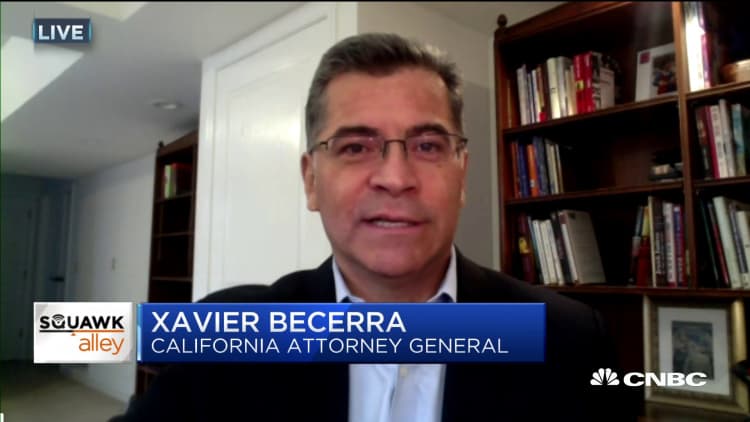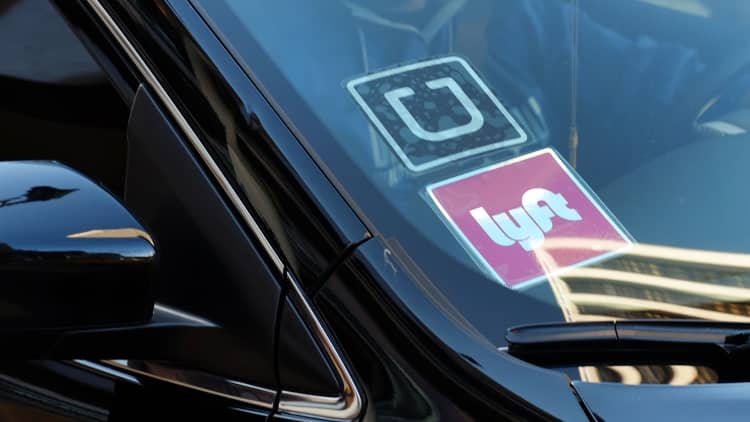Uber and Lyft got their way on Thursday when an appeals court ruled to extend a stay on an order requiring them to reclassify drivers as employees. But their legal battle in that case — and elsewhere in California — is far from over.
The case involves a lawsuit from California's attorney general and city attorneys from San Francisco, Los Angeles and San Diego that alleges Uber and Lyft violated the state's new labor law, Assembly Bill 5 (AB5), by misclassifying rideshare drivers as contractors.
The law aimed to provide additional protections to gig workers by installing a three-pronged test for whether a worker is truly independent or should be considered an employee. To be considered independent, workers must be "free from the control and direction of the hiring entity," do work "outside the usual course of the hiring entity's business," and be "customarily engaged in an independently established trade, occupation, or business of the same nature as that involved in the work performed."
On Aug. 10, a trial court granted the state a preliminary injunction that would require Uber and Lyft to reclassify their drivers as employees beginning Aug. 21 before the appeals court extended the stay. The injunction requires Uber and Lyft to take on the additional costs related to employment if they continued to operate in the state, like payroll taxes and unemployment insurance.
The companies said they would have to temporarily shut down in California in order to rework their businesses to comply with the injunction and rehire workers as employees. They said they would likely have to slash the number of workers they could employ once they returned, create more rigid work schedules for drivers and raise prices for riders. Lyft said it would shut down in California by midnight Thursday when the stay on the injunction was set to expire before the appeals court issued its ruling. Lyft reversed its decision in light of the extended stay.
California officials argue that nothing in the law requires Uber and Lyft to eliminate flexible work for drivers, but the companies have said it would be logistically implausible for them not to.
For now, Uber and Lyft say they'll remain in the state under the same system they've typically operated. But there are still several events that could change that.
Here's what the road ahead looks like and the other legal threats that could impact Uber and Lyft's future in California.
State lawsuit

The appeals court ruling only extends how long Uber and Lyft have to maintain the status quo in California during court proceedings. Even so, Uber and Lyft must agree to a series of conditions by Tuesday at 5 p.m. PT in order for the stay to remain through the appeals process. If they don't, the stay expires after that deadline.
Uber and Lyft said they would remain in the state after the ruling, which seems to indicate they're at least considering the court's conditions.
Some of those conditions are more technical in nature, such as requiring Uber and Lyft to combine their appeals. The most consequential condition requires the CEOs of Uber and Lyft to submit a sworn statement saying they have developed plans to comply with the preliminary injunction within 30 days of a ruling if the appeals court upholds it and the ballot measure that would exempt Uber and Lyft from AB5 fails to pass in November.
California officials can ask the court to throw out the stay if they believe Uber and Lyft violate the procedures at any point.
Here are the key dates in the appeal:
- Aug. 25 by 5 p.m. PT: Uber and Lyft must file written statements agreeing to the timeline and conditions laid out by the court in order for the stay on the injunction to be extended through the appeals process. Otherwise, the stay expires at this time.
- Sept. 4: Uber and Lyft must submit opening briefs by this date along with sworn statements from their CEOs certifying they have a plan to comply with the law if their appeal and ballot measure both fail.
- Sept. 18: California officials must file their response.
- Sept. 25: Uber and Lyft can submit responses to the state's brief.
- Oct. 13: Oral arguments occur before the court.
California labor commissioner lawsuit
Uber and Lyft face separate lawsuits from the California Labor Commissioner's Office alleging they illegally denied wages to their workers. Similar to the attorney general's lawsuit, the labor commissioner's office alleges Uber and Lyft misclassified workers as contractors under AB5, unfairly withholding pay and benefits from them. Uber and Lyft have maintained they are technology providers and that drivers who use their platforms are independent.
The trial court's ruling in the state lawsuit could indicate a similar outcome for Uber and Lyft in this separate suit. The judge who granted the attorney general's request for a preliminary injunction wrote that Uber's argument that drivers' work was outside the ordinary course of its business was "a classic example of circular reasoning."
San Francisco lawsuit against DoorDash
Before the appeals court ruling, an Uber official told Eater it planned to continue operating its food delivery service, Uber Eats, in the event that the injunction is enforced and its ride-hailing business is suspended in California. The state's case applies specifically to Uber and Lyft's ride-hailing drivers, a segment that's already been depressed by low ridership during the pandemic.
But a lawsuit from the San Francisco district attorney against Uber Eats rival DoorDash could have implications for Uber's food delivery service as well, which has buoyed its business during stay-at-home orders across the U.S. The lawsuit relies on a similar argument that the attorney general and labor commissioner lay out against Uber and Lyft's ride-hailing businesses under AB5.
Proposition 22
Proposition 22 is the wild card in this equation.
That's the ballot measure Uber and Lyft have each poured $30 million into funding and would exempt their businesses from AB5.
If voters in November vote yes on Prop 22, app-based rideshare and food delivery services like Uber and Lyft will be carved out from the obligations of AB5. It could render any unfavorable rulings against them virtually meaningless. The companies could more or less continue operating under their current models, though the ballot measure entitles workers to additional protections like minimum earnings, health-care subsidies and car insurance.
If the measure fails to pass, however, Uber and Lyft would be forced to comply with court rulings on their responsibility under AB5, unless they again appeal to a higher court and win.
When Uber and Lyft faced a similarly unfavorable law in Austin in 2016, they left the city and took their grievances to the state of Texas. In that case, Texas agreed with the companies and overturned the city's background check law that Uber and Lyft had opposed.
If Uber and Lyft fail to win their ballot measure in November, their next step is likely to lobby the U.S. Congress.
WATCH: Uber and Lyft win delay in converting drivers to full-time employees



